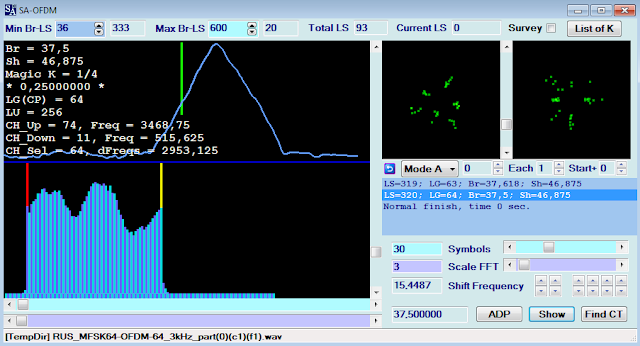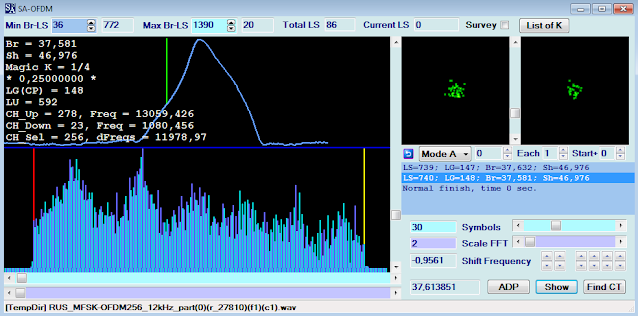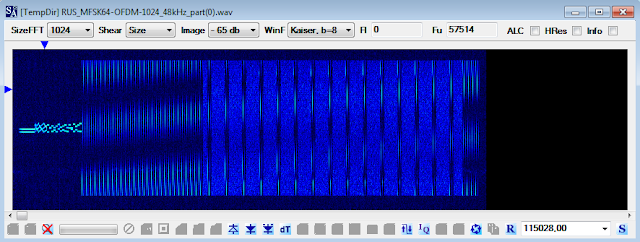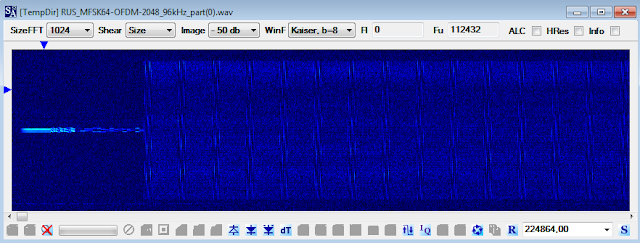A new family of wideband OFDM signals has recently appeared on-air, most likely tests of Russian origin, and which - at least according to the observations carried out so far - seems to be composed of six waveforms which for convenience I call OWF (OFDM Waveform):
OWF3: 3 KHz bandwidth, OFDM 64-tone
OWF6: 6 KHz bandwidth, OFDM 128-tone *
OWF12: 12 KHz bandwidth, OFDM 256-tone
OWF24: 24 KHz bandwidth, OFDM 512-tone
OWF48: 48 KHz bandwidth, OFDM 1024-tone
OWF96: 96 KHz bandwidth, OFDM 2048-tone
* the OWF6 waveform has not been observed "directly" but its characteristics and main parameters can be obtained from early-test transmissions [1]
Note that, unlike the western 188-110D App.D (single-tone waveforms, not OFDM), the bandwidths of 9, 15, 18, 21, 30, 36, 42 are missing.
The six waveforms share some common features:
1. initial preamble consists of an LFM segment followed by MFSK-64 37.5 Bd segment
2. MFSK segent is followed by up-chirped FMCW (Frequency Modulation Continuous Wave) sweeps
3. data transfer is arranged in 15 OFDM blocks, separated by chirps as in 2
4. OFDM blocks have all the same speed of 37.5 Baud and same channel separation of 46.8 Hz
5. in some waveforms (OWF1, OWF24, OWF48) the initial MFSK preamble is followed by the same up-chirped sweeps as in 2
It's interesing to note that OFDM parameters fit DRM-B ones.
OWF3 (3 KHz bandwidth)
 |
| Fig. 1 - 3 KHz bandwidth waveform |
 |
| Fig. 2 - 3 KHz bandwidth OFDM |
OWF6 (6 KHz bandwidth)
 | |
| Fig. 3 - 6 KHz bandwidth waveform |
 |
| Fig. 4 - 6 KHz bandwidth OFDM |
OWF12 (12 KHz bandwidth)
 | |
| Fig. 5 - 12 KHz bandwidth waveform |
 |
| Fig. 6 - 12 KHz bandwidth OFDM |
OWF24 (24 KHz bandwidth)
 |
| Fig. 7 - 24 KHz bandwidth waveform |
 |
| Fig. 8 - 24 KHz bandwidth OFDM |
OWF48 (48 KHz bandwidth)
 | |
| Fig. 9 - 48 KHz bandwidth waveform |
 |
| Fig. 10 - 48 KHz bandwidth OFDM |
OWF96 (96 KHz bandwidth)
 |
| Fig. 11 - 96 KHz bandwidth waveform |
 |
| Fig. 12 - 96 KHz bandwidth OFDM |
While the vast majority of Western countries use single tone waveforms (see the aforementioned MS-110D) Russian friends favor the development of multi-tone waveforms, as OFDM in this case: I am not able to make a comparison of performances, there is certainly a valid reason behind preferring one approach or the other.
Thanks to my friends ANgazu, Joni, Linkz and KarapuZ for sending me their recordings.
(to be continued)
https://disk.yandex.com/d/s4FclhpM7ZFbAw
[1] http://i56578-swl.blogspot.com/2016/05/cis-ofdm-64-tone-qam-16-40bd.html
No comments:
Post a Comment